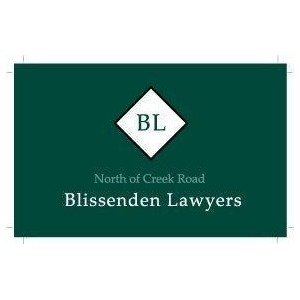Best Collaborative Law Lawyers in Moonah
Share your needs with us, get contacted by law firms.
Free. Takes 2 min.
Free Guide to Hiring a Family Lawyer
List of the best lawyers in Moonah, Australia
About Collaborative Law in Moonah, Australia
Collaborative Law is a legal procedure where both parties to a dispute engage their own lawyer, and these lawyers work together to help them reach a mutually beneficial settlement. In Moonah, as with the entirety of Australia, it is frequently used in family law disputes, such as divorce settlements, but it can be applied in other areas such as business law and construction law.
Why You May Need a Lawyer
When facing any legal situation, your personal and financial interests can be protected more effectively with professional legal help. Specifically, in Collaborative Law, an attorney's role is to guide you through the collaborative process, provide advice on your rights and responsibilities, and negotiate on your behalf to reach an optimal resolution. Common situations where you might require legal help involve divorce or separation, custody disputes, or contract disagreement in business partnerships.
Local Laws Overview
The Practice Guidelines for Collaborative Professionals, developed by the International Academy of Collaborative Professionals, applies universally to collaborative law cases in Moonah, Australia. This outlines the responsibilities of each party, the confidentiality standards and the procedure for voluntary disclosure of information. Additionally, under Australian law, all parties involved in the process must agree to cooperate in good faith, exchange pertinent documents and information, and respectfully negotiate to reach a mutually acceptable settlement. If no agreement is reached, the lawyers must withdraw from the process and cannot represent either party in a courtroom proceeding.
Frequently Asked Questions
What is the main advantage of using Collaborative Law?
Collaborative Law aims to resolve legal issues in a less adversarial manner and it usually less time-consuming and less costly than traditional litigation. It also tends to work towards preserving relationships between individuals, which can be particularly important in family or business disputes.
What if we cannot reach an agreement in the collaborative process?
If an agreement cannot be reached, each party will need to retain new legal representation for any subsequent litigation as the collaborative lawyers are prohibited from serving in a litigation role.
Do all lawyers practice Collaborative Law?
No, not all lawyers practice Collaborative Law. It's an area of specialization and lawyers who wish to practice it usually undergo additional training and certification.
How long does the collaborative process usually take?
The length of the process varies greatly and is dependent on the complexity of the dispute and the willingness of the parties to reach a resolution. On average, it can last from a few months to a year.
Is Collaborative Law only applicable for family law matters?
No, whilst it is commonly used in family disputes, it can be applied in various other areas such as commercial law and construction law.
Additional Resources
If you want to explore more about this field, some resources include the Collaborative Professionals NSW (comprising lawyers, psychologists, and financial advisors specializing in the process), or the Law Society of Tasmania. Both associations provide information and resources on Collaborative Law.
Next Steps
If you find yourself in need of legal assistance in Collaborative Law, your first step should be to research and find a local lawyer specializing in this field. Make sure they have the required training and certification before engaging their services. Once you have selected your lawyer, you can proceed by scheduling a consultation to discuss your case in detail and plan your strategy for the collaborative process.
Lawzana helps you find the best lawyers and law firms in Moonah through a curated and pre-screened list of qualified legal professionals. Our platform offers rankings and detailed profiles of attorneys and law firms, allowing you to compare based on practice areas, including Collaborative Law, experience, and client feedback.
Each profile includes a description of the firm's areas of practice, client reviews, team members and partners, year of establishment, spoken languages, office locations, contact information, social media presence, and any published articles or resources. Most firms on our platform speak English and are experienced in both local and international legal matters.
Get a quote from top-rated law firms in Moonah, Australia — quickly, securely, and without unnecessary hassle.
Disclaimer:
The information provided on this page is for general informational purposes only and does not constitute legal advice. While we strive to ensure the accuracy and relevance of the content, legal information may change over time, and interpretations of the law can vary. You should always consult with a qualified legal professional for advice specific to your situation.
We disclaim all liability for actions taken or not taken based on the content of this page. If you believe any information is incorrect or outdated, please contact us, and we will review and update it where appropriate.








